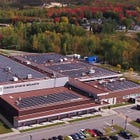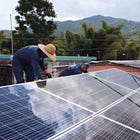Bet You Could Use Some Nice Climate 'N' Energy Things Today, Huh?
The terrible stuff is still out there. But don't forget to recharge.

Well, that was Week One of 208 in the second Trump administration, and we are both worn out and recommitted to getting through this mess, and to helping our readers face it too. With that in mind, we’re going to make a point of occasionally bringing you some reminders that there are still good people out there making good news, even while the established constitutional order in the USA is starting to look more and more like a dirty sock that the dingoes got to. (A purely speculative simile, I should add. If dingoes turn out to be very loving, diligent custodians of laundry, we will of course retract.)
Today, let’s just do a quick, Wonkette Tabs-style list of some neat things happening with climate and energy. Think of it as an environment-style way of Looking for the Helpers.
It’s Our World, So We Have To Care For It
Ecuador’s Constitutional Court ruled earlier this month that the country’s coastal marine ecosystems have actual rights for protection and restoration. (Ecowatch)
A women-driven effort to plant trees in Uganda is making progress in reforesting areas that have been hit hard by climate change. Planting indigenous trees like ficus and Dracaena afromontana provides shade and help reduce erosion, and then there’s the whole women’s economic empowerment thing, too. (Mongabay)
Florida Fish and Wildlife Conservation Commission officers successfully rescued some 30 sea turtles that were stunned by the recent freezing temperatures and snow along the Gulf Coast. Another 40 turtles in Volusia County are also being rehabilitated at a Marine Science Center. Once they recover, they’ll be returned to the wild. (WESH-TV)
This is one of those decidedly mixed Nice Time stories: The government of the Democratic Republic of the Congo is creating the world’s largest reserve for tropical forest, protecting an area of the Congo River basin the size of France that serves as one of the world’s biggest carbon sinks. It hopes to create green jobs and clean energy development, as well as to stop trafficking of natural resources. Unfortunately, part of the reserve in the eastern part of the country is where rebels aligned with neighboring Rwanda have been fighting against the government for decades; rebels are now about to capture the major city of Goma, and that’s all looking horrible. (World Economic Forum / AP)
Sometimes people save themselves by saving their own parts of the planet. Read this cool redemption story about Juan Guillermo Garcés, 74, a man in Colombia who as a teenager nearly died when he was burning a section of jungle to create cattle pasture on his family’s ranch. He went on to found a nature preserve that’s protecting biodiversity in an area where more than 100 new species have been identified. About 80 percent of the reserve is reclaimed farmland that has been allowed, over decades, to return to jungle. (Guardian)
Clean Energy Too!
This is a big one: In 2024, solar generated more of the EU’s electricity (11 percent) than coal (down to just 10 percent) for the first time ever. Gas generation fell for a fifth straight year, and total fossil fuels used for energy dropped to an all-time low, 29 percent in 2024, compared to 39 percent just five years ago. Wind also generated more of the EU’s power (17 percent) than gas (16 percent) for a second year in a row. (Elektrek)
Also, some specifics on energy progress in various European countries! Italy is now getting not quite half of its electricity from renewables, as more hydroelectric and solar come online and coal-powered plants are decommissioned. (Il Post; in Italian with Google translation)
Those cheese-eating nuclear show-offs in France have the rest of the Euro Zone beat when it comes to decarbonizing their grid, with nuclear and renewable energy providing 95 percent of the nation’s electricity in 2024. Nuclear and hydroelectric production both surged, and France’s nuclear plants have mostly recovered from maintenance problems that, along with Russia’s invasion of Ukraine, worsened Europe’s energy crisis. France exports much of its electricity to other EU countries. (Bloomberg via Reddit [requires email signup])
Anyone who tells you renewables can’t power growth in developing nations is probably trying to sell you fracking and a dirty refinery. Water wheels are having a moment as a new source of small-scale electricity generation in places from England to Nepal. Another excellent choice for local mini-grids, along with solar and battery storage. Hey, any bored billionaires really want to do some good? Small electric projects — and training electricians, and supporting local clean-energy entrepreneurs — all over the developing world! (Guardian)
Hey, speaking of economic development and clean energy, a startup in Tanzania is manufacturing backpacks equipped with solar panels and batteries, plus a reading light, that lets kids in areas with no electricity study at night. The company has grown from a small demonstration project to selling 36,000 of the backpacks in Tanzania and other African countries so far. (CNN)
Well now I have a little more optimism to recharge my own supplies. Hope you do, too!
Yr Wonkette is funded entirely by reader donations. If you can, please become a paid subscriber, or if a one-time donation lights up your eyes, help us with our electrifying coverage of the energy transition that way!






california is also doing some good in demonstrating (along with other places) that intermittent renewables staggered across a wide area + batteries can be **largely** stable baseload power.
It's not perfect. It's not providing the baseload for 365 days a year, but it provided 100% of electricity over a 24 hour period for more days than ever last year -- over 100 days, if I remember correctly.
Batteries are still expensive b/c so much R&D has been focussed on making them lightweight rather than as cheap as possible (the lightweight ones are necessary for vehicle use). However we have to consider three things:
1) there are now non-lithium ion batteries that have better cycle-life economy (they last longer for a similar price) and in some cases are just flat out cheaper AND have better cycle-life, meaning the cycle-life economy ridiculously outstrips Li-Ion for applications where it's okay if the batteries are heavy.
2) Those batteries with better economy and/or cycle life are ramping up production and have already been installed in a few grid-backup facilities.
3) The batteries make solar power a better investment. This requires a 3a and 3b:
(a)Prices for electricity are cheaper when solar panels are making the most possible electricity (middle of the day) and demand is moderate, and spikes in the early evening when kids and parents come home and start using electricity in residences while most businesses aren't actually closed down yet -- there may be fewer people in the office/workplace/whatever, but they still have ALL the lights on, since you can't ration the lights on a per-eyeball basis.
(b) If batteries are filling during the day, that increases demand for that middle-of-the-day cheaper energy, and if they're discharging in the evening, that allows them to make a profit off that energy bought in the middle of the day.
The result of 3a and 3b together is that solar electricity can be sold for more money during the day and still allow the battery developments to pay for themselves reselling that electricity at a higher price later EVEN IF the higher evening price next year is less than the peak price this year. Over time, this dynamic allows the daytime price and the evening price to come closer together. Now, this is bad news for batteries, which will have less margin to work with to pay for themselves, but it's great news for solar, and since battery manufacturers are finally ramping up production of heavy, cheap batteries for stationary use, future battery installations can still make money since they'll be cheaper up front and have a longer lifetime of maintenance-free buying and reselling. If you make a penny a day but last 100x longer than the battery that earns a quarter a day, you eventually make more money. (Inflation will cause investors to still value that distant income less than near-term income, but this is just an example -- the point is that energy price margins between noon and 6pm will narrow, but the changing economics of batteries will keep them profitable for a long time.)
And if all that wasn't good enough, even as Californians are buying more electric vehicles, demand went DOWN by 1% last year.
Why?
In a word: wildfires. The terrible choices of PG&E (California's main electrical utility) have led to many fires, which led to billions of dollars in liability. That means that ratepayers are paying for not just electricity, but also PG&E's lawsuit payouts. And that means that economically speaking, the savings from rooftop solar is even better. Combine that with state subsidies on home battery systems (that make sure that daytime solar generation isn't wasted for people at work) and power conservation measures, and you're adding so much peak-hour distributed capacity and seeing so many home owners change to more efficient devices that total demand on the central grid has dipped.
In sum, California is showing that 24-hour renewable energy cycles can work without fossil fuel baseload power, and the state is decarbonizing more quickly than expected -- even with AI and EVs.
Columbia refuses US deportation flights.
Now?
Sanctions, travel bans, and tariffs. 25% now, 50% in a week.
https://www.reddit.com/r/LeopardsAteMyFace/comments/1iaoayb/they_voted_for_lower_grocery_prices/#lightbox
***
Grocery prices will come down any minute now.